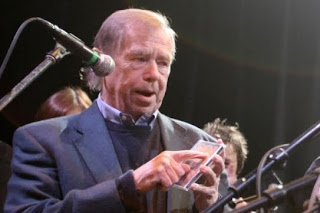

Below is a rushed translation of an article which appeared online on the Týden website on Wednesday. For those of you who wish to view the original, please look here
(On Tuesday evening, in Prague). In a sold-out Palace Akropolis, the new studio album by the legendary group The Plastic People of The Universe was launched or baptised, as the Czechs out it, by former (Czech) President, Václav Havel. The recording, titled The Mask Behind The Mask, was first showcased on 15 January at the prestigious Queeen Elizabeth Hall in London. After the Prague launch, the legendary band will go on tour.
The Plastic People of the Universe are, arguably, even 20 years after the fall of the communist regime, the most famous Czech rock band abroad whilst at home the band is the one that is most wreathed in myth and mystery. After a nine-year break, they have released a new studio album.
The album was released last year on 23 December by the independent music label Guerilla Records. The CD, the first in the history of the band to include music composed by other band members. Their long-standing and sole composer, Mejla Hlavsa, died in 2001. “It is not a good idea to baptise a record with bubbly, that’s just wasteful, and I prefer to drink it,” said Havel on-stage to thunderous applause.
The band was joined on stage at the launch by cellist Josef Klíč, who also performed on the recording. The planned appearance of the support act Aku Aku was cancelled for technical reasons. After the launch, the Plastics are to go on a concert tour that finishes on 30 April in Dvůr Králův nad Labem. The main composer on the album, with six credits, is the band’s guitarist, Joe Karafiát, while a major part of the lyrics is in the form of the unique verse of Vratislav Brabenec, the remainder provided by (Czech poets) J. H. Krchovský, Andrej Stankovič or Jiří Kolář. (MS: Also, but forgotten in the piece, is Tiger in Prague by the pre-war Russian ‘absurdist poet’ Daniil Kharms.)
For the first time ever, the repertoire includes a musical setting of a text written by the band’s former manager, Ivan Martin Jirous (Magor).
Since the band formed in 1968 almost 40 musicians have taken a turn in it, most of them staying for only a short time. With the onset of normalisation in 1970 the band were stripped of their professional status and, with it, their equipment.
The (Communist Czechoslovak) state’s intimidation reached a climax in March 1976 when all The Plastics were arrested, which led to international protest. What later became Charter 77 was formed during the campaign to defend them. The band even recorded at Václav Havel’s country cottage.